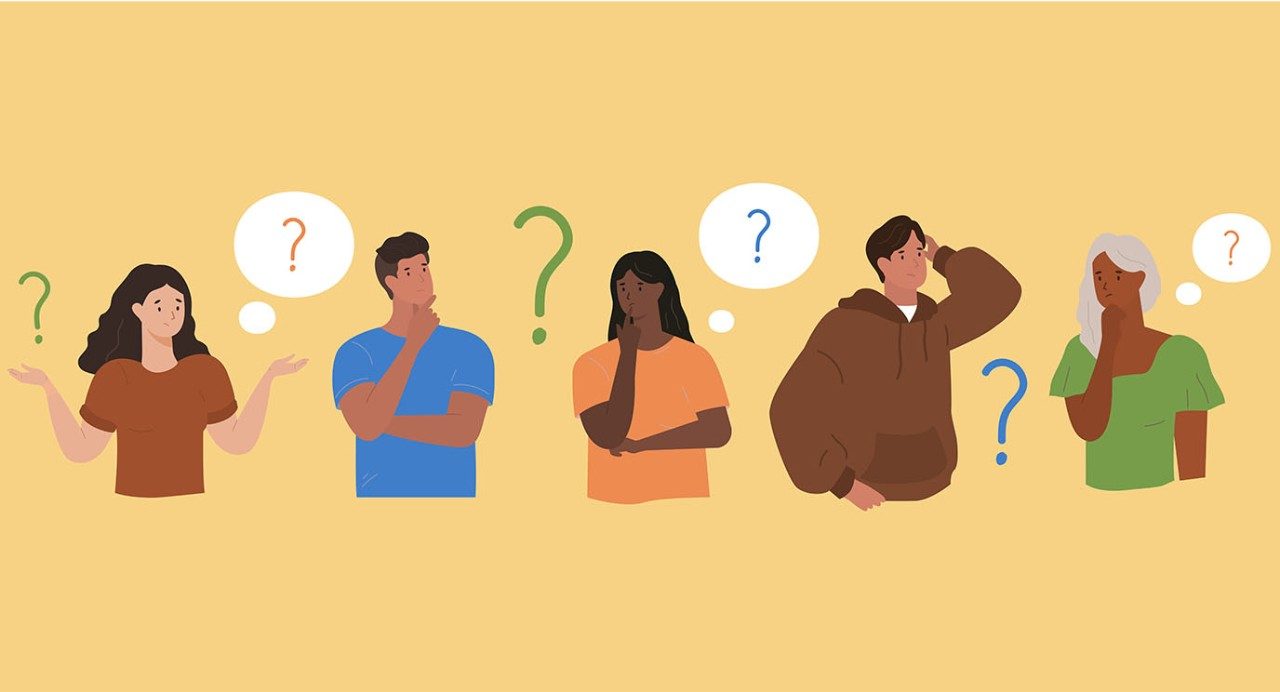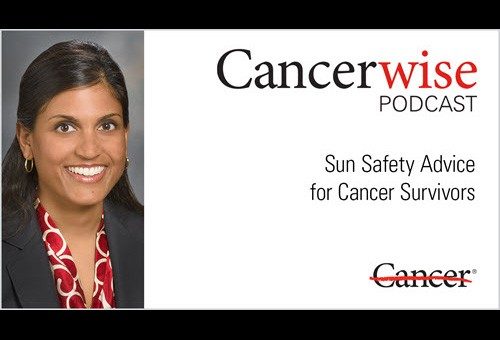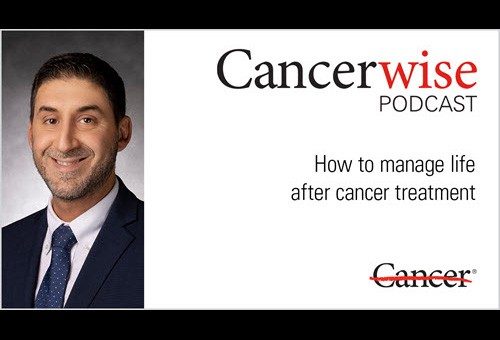Congratulations! You have completed cancer treatment and have a new outlook on life. At MD Anderson, we know that being a cancer survivor brings its own set of challenges that affect every aspect of your life. It's our goal to make life after cancer the best it can be, and we have the resources to help get you there.
Resources
Cancerversaries: How and why cancer survivors celebrate
If you’re a cancer survivor, you may have heard the term ‘cancerversary.’ A combination of the words ‘cancer’ and ‘anniversary,’ a cancerversary is a day of celebration for someone who has experienced cancer.
“Celebration dates are personal to every individual and what they feel was the most meaningful event for them,” says senior social work counselor Tabeen Urbach. “Celebrations can occur on the day they were first diagnosed, the day they completed surgery to remove cancer, the day they completed treatment or any other milestone that is important to them.”
Celebrate as often as you like
Several dates may be important to you. Perhaps you want to celebrate the day of your diagnosis. Maybe you want to celebrate the day you learned there was no evidence of disease – sometimes called a NEDaversary. Maybe you want to celebrate both days. However often you’d like to celebrate, do it.
“There is no rule for how often someone can celebrate,” says Urbach. “People may choose to celebrate and make the most of every day, since every day is a gift.”
Celebrate however and with whomever you like
A cancer diagnosis is life-changing. You may have side effects from treatment or be physically unable to do things you used to do. Some survivors choose humor as a more light-hearted approach to their cancerversaries because going through cancer itself was so heavy.
Stage IV breast cancer survivor Olivia Franz was told she had no evidence of disease on March 30, 2021.
“My family celebrates this day every year with a nice dinner and a cake that says, ‘Good job not dying,’” says Olivia. “We’re planning something big for five years – possibly a cruise or an international trip.”
While celebrating with loved ones can be nice, some survivors may want to spend the day alone. “It’s important that survivors be provided a safe space to spend the day in the manner that feels right for them,” says Urbach.
She shares some other ways survivors can choose to celebrate, with as few or as many people as they want:
- Enjoy an intimate dinner with loved ones.
- Throw a big party, and invite everyone you know.
- Plan a big trip or vacation to somewhere on your bucket list.
- Create a celebratory post on social media.
- Get involved with a local cancer organization by fundraising, sponsorship or attending a community event.
- Visit the hospital where you were treated to give back through acts of kindness. Bring snacks, blankets, books or other items that were comforting to you to other patients going through treatment.
“Sometimes, the best way to support your loved ones on their cancerversary can be as simple as just showing up to ask how they are doing and being there to listen,” she says.
It’s OK not to celebrate
For some survivors, a cancerversary is not a happy occasion. Instead, it’s a stark reminder of one of the most difficult times in their lives.
“The truth is that you may still feel sad about your cancer journey, no matter how many days or years have passed since your initial diagnosis,” says Urbach. “It’s important to acknowledge that a cancer diagnosis can be traumatic, and not everyone will want to celebrate or acknowledge the day they started this journey.”
And that’s OK. You don’t have to celebrate if you’re not feeling up to it.
Lean into why you’re celebrating
It’s normal to feel a range of emotions leading up to, or during, a cancerversary.
“Cancerversaries can be emotionally challenging. You may be grieving the life you had before cancer while also feeling gratitude for the present and the life that you have,” says Urbach. “Since the cancer diagnosis may have disrupted your life and your future plans, you may feel like you missed out on celebrations and milestones that your family and friends experienced while you were going through treatment, such as college graduations, career promotions, weddings and births. It’s important to acknowledge that you deserve to celebrate your milestones, even if your new normal is different from what you were expecting.”
When Bart Wilson was diagnosed with stage IV colon cancer at age 37, he was told he had a 15% chance of living five years.
“I’m not into big celebrations, but if I reach the five-year mark of being cancer-free next year, my family plans to take a big trip to celebrate,” says Bart. “They acknowledge the day I showed no evidence of disease each year, but I always wanted to reach that five-year mark before doing any celebrating.”
Cancerversaries have different meanings for everyone.
Celebrating the day you were diagnosed can help you take back some control over a difficult day, notes Urbach, adding that cancerversaries can help you reframe your mindset from a sad day to a day of gratitude over how far you’ve come to get to this anniversary.
“Celebrating a cancerversary is really about celebrating yourself and the determination, resilience and strength it took to get you to where you are today,” she says. “Honoring the anniversary of your cancer journey can be emotionally healing. It allows you to reflect on your cancer experience and identify, acknowledge and process your emotions and celebrate everything you’ve accomplished in reaching this milestone.”
Request an appointment at MD Anderson online or call +1 346 503-2729.
Ovarian cancer survivor, employee: Treatment at MD Anderson is ‘the best decision I ever made’
I work in Philanthropy at MD Anderson, and I’m a cancer survivor. This means I can say I’ve been both an employee and a patient at the greatest cancer hospital in the world.
In 2018, I was diagnosed with a type of ovarian cancer called dysgerminoma. I was 32 years old, so this was a rare cancer for someone my age. I found out about my cancer diagnosis through my annual well-woman exam. My normal gynecologist was pushing down on my belly and felt something hard that shouldn't be there. I ended up having surgery to remove it. It turned out to be cancer. I immediately knew that MD Anderson was where I wanted to be treated.
Getting a cancer diagnosis at such a young age is shocking and terrifying. It's not supposed to happen; it’s odd, scary and overwhelming. But, as an MD Anderson employee, I knew firsthand how patients are treated and how care is individualized to the patient. I knew my best chance for treatment was going to be at MD Anderson.
Hands down, it was the best decision I ever made.
Today, I’ve been cancer-free for six years. Here are three perspectives I learned through my cancer treatment.
1. A deeper understanding of individualized care
As an employee, you're always told that we prioritize individualized care at MD Anderson. But it's not until you become a patient that you experience it. Making that shift connected so many dots and allowed me to understand another side of MD Anderson.
Going in for your first appointment is terrifying and overwhelming because of all the unknowns. Chemotherapy was a huge fear of mine because I'd seen chemo portrayed on television and in movies as people who get really sick and just waste away. But my care team did such an amazing job of making me not just feel welcome, but also safe. They were one of the biggest reasons why I felt like I was going to be OK. I'm a person who wants to know as much as possible, so my team provided me with a lot of information. That way, I wouldn’t have to wonder and worry. They were so caring, warm and professional; they knew exactly what we were dealing with. My cancer is a rare cancer, but at MD Anderson, it's not rare.
My care team also asked me questions about my daily life so they could tailor my treatment plan to my needs. The very first day that I met my doctor, he asked if I got motion sick. I said yes, and a couple hours after I saw him, he gave me a call and said that we were going to change my chemo regimen to a different drug that would help me avoid that. Then, before starting treatment, I met with a pharmacist to learn about the medications I'd be taking. When we discussed anti-nausea medications, she told me to let her know if my medication didn’t work so she could find me a better option. Little things like that really made me feel special and cared for.
2. The importance of ‘just another Thursday’
I tried to keep my life as normal as possible during treatment. This included both my routine and my relationships.
I couldn't go into the office when I was having chemo, so for the week after chemo, I would work from home. Then, when I went to the office, I’d try to make it just like another Thursday. At times, chemobrain made it hard to remember things, which would get very frustrating, so I started writing lots of things down. I had to learn to be gentle with myself when those times happened; it was a moment, it wasn't forever.
For my own mental sanity, I still needed to joke with my friends and have typical conversations with people. I talked to family and friends about acting normal around me. I told my parents, “It's going to be fine. Everything is normal. We can talk about it. Ask me questions, but let's not tiptoe around anything."
My care team also provided me with a sense of normalcy in a time when nothing felt normal. Before my chemo appointments, we would chat about our personal lives and upcoming trips. These casual conversations made me feel comfortable messaging them with all my treatment questions. I never felt like I was bothering them; instead, it really felt like they loved talking and chatting and hanging out.
I also meditated, practiced yoga and journaled during treatment. One of my neighbors would drop by to do art projects during lunchtime when I was working from home. That connection was a little pick-me-up that helped as I tried to keep everything as normal as possible.
3. What it means to be a cancer survivor
Even though I am a cancer survivor, I’m still very connected to MD Anderson. My post-cancer care and support has been great. My care team is wonderful and optimistic. If I'm ever feeling like I need extra support, I can talk to our Social Work team or reach out to support groups.
Today, my experience as a patient gives me a unique perspective in my role on the Philanthropy team. Donations are pivotal. Fundraising is a huge reason why MD Anderson is so successful and can invest so much in research, clinical trials, support programs like our Adolescent and Young Adult Program and Children’s Cancer Hospital, and other resources for patients and their networks. Cancer doesn't just affect the patient, it affects everyone in that patient's life. MD Anderson provides patients and their families and friends with so many resources to help them get through a really difficult time.
My role as a survivor is a huge milestone and accomplishment. It’s also a reminder of my responsibility to encourage other people to get preventative exams. If my cancer diagnosis can help somebody else down the road, then it was all worth it.
Request an appointment at MD Anderson online or call +1 346 503-2729.
Remission, cancer-free, no evidence of disease: What’s the difference?
To a cancer patient, one of the most magical words in the English language may be “remission.” For those fortunate enough to hear it, it imparts not only a much-hoped-for dose of good news, but also a profound sense of relief.
But what does the term “remission” actually mean? And how does it differ – if at all – from “no evidence of disease,” or even “cancer-free?”
We asked medical oncologist Phat Le, M.D., for insight.
What’s the difference between remission, cancer-free, and no evidence of disease?
A lot of people use those terms synonymously, but “remission” and “no evidence of disease” (also known as NEOD or NED) are probably the closest by definition. Officially, both mean that no cancer is currently detectable in the body. That may be based on scans, bloodwork or some other kind of test, such as a breast biopsy or a bone marrow biopsy.
“Cancer-free” is a little more complicated, because it’s not based on something we can measure. Instead, it implies that not only is there nothing detectable in your body as cancer, but we also believe no residual cancer is left anywhere, so there’s no chance of the cancer ever coming back. And that’s a lot trickier to say, because there’s always at least a very slight risk of recurrence, if you’ve ever had cancer before.
So, how do doctors determine which term to use with a particular patient?
That’s really based on the doctor and what they feel comfortable with. Personally, I tend to use “remission” and “no evidence of disease” the most.
Does the type of cancer influence which term you use?
No. But it will determine which type of surveillance testing your doctor chooses.
With solid tumors like lung cancer, for instance, doctors might order a CT scan. But with prostate cancer and ovarian cancer, doctors might use blood tests to look for tumor markers or certain proteins. Doctors also look for evidence of diseased cells in blood or bone marrow samples with leukemia, lymphoma and other blood cancers.
Does the length of time a cancer survivor has gone without a relapse affect which term doctors use?
No. Not really. There are no special terms used for going 5, 10 or any other number of years without a recurrence.
But sometimes, doctors will declare a patient “cancer-free” after a certain amount of time has passed without a relapse. It usually coincides with the transition from active surveillance into survivorship, when patients begin needing fewer or less frequent check-ups.
What’s the one thing people should know about this topic?
Though all of these terms are sometimes used interchangeably, it’s important to ask your oncologist specifically what they mean. Because I may use it one way, and another physician might use it another.
It’s also important for all cancer survivors to be on some type of surveillance program. Some cancers are considered very low-risk, so if you’ve already gone 5 or 10 years without a recurrence, it’s highly unlikely that you’ll ever have one. But it’s still not impossible. So, you need to keep an eye on it, just to make sure that if the cancer ever does come back, you catch it as soon as possible.
Request an appointment at MD Anderson online or by calling +1 346 503-2729.






